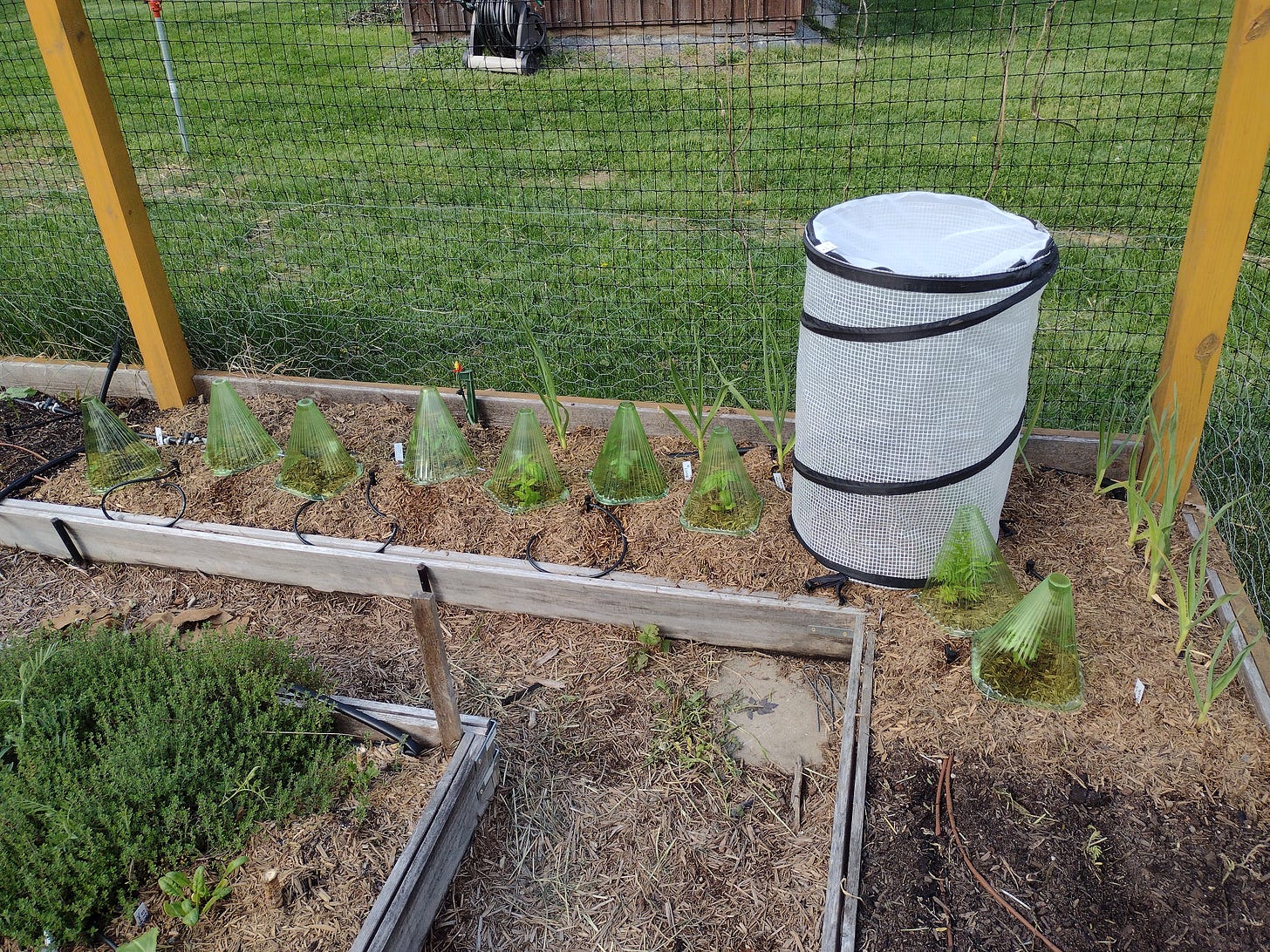Frost
Just like there is no "good" amount of frost for a tomato plant, there is no "good" amount of sin for your soul.
Earlier last week, the seedlings in the laundry room were starting to show some signs of stress from living indoors. The last frost date was at the end of April, but I saw an opportunity to come out to the garden last Thursday. I checked the weather—some low temperatures expected but no sign of freezing. I decided to take a risk and put the plants in the ground on Thursday.
Saturday morning came around and I checked the weather. There was now a freeze warning for Sunday night. Nuts. A frost would likely kill off many of the seedlings I had planted. I managed to order a set of cloches to cover the seedlings that could be delivered the same day via Amazon. They arrived Saturday evening. Sunday afternoon I headed out to the garden and covered the plants with cloches.
It was very cold Monday morning so I was glad I had done the work. I had also draped a frost blanket over the tomato plant cloches overnight. Having survived the scare, I checked the weather again. There was another freeze warning for Monday night! Tuesday morning I removed the frost blanket and went home. I was able to return Wednesday evening and survey the damage.
The good news is that the cloches and frost blanket over the tomato and basil plants worked. All of those plants survived and appear healthy. The other plants that were only covered with cloches look alive but damaged. The tomato plants that I left under a white tomato tunnel, however, appear dead.
I started writing this post in the middle of this process, thinking that a spiritual lesson would emerge. Finally after surveying the different levels of damage from the frost tonight, the realization came to me that the effect of frost on tomato plants is like the effect of sin on the soul.
There is no “good” amount of frost for a tomato plant. Tomato plants cannot recover from frost if the plant is frozen. Full exposure to frost will simply kill the entire plant. If the plant is not completely frozen, or is protected in some way, the frost damage may only damage parts of the plant and it can recover. The damage may make the plant vulnerable, however, to insect damage and disease. There is no amount of frost that is good for a tomato plant—you need to protect it.
Likewise, there is no “good” amount of sin for your soul. Some kinds of sin will kill your soul completely. Other kinds will damage and darken parts of your soul. It may make your soul vulnerable to attack from the enemy and temptation to more serious sin. There is no amount of sin that is good for your soul—you need to protect it.
Scripture tells us that there is a difference between mortal sin (deadly sin) and sin that is not deadly (called venial sin). St. John explains:
If anyone sees his brother sinning, if the sin is not deadly, he should pray to God and he will give him life. This is only for those whose sin is not deadly. There is such a thing as deadly sin, about which I do not say that you should pray. All wrongdoing is sin, but there is sin that is not deadly.1
“For a sin to be mortal, three conditions must together be met: ‘Mortal sin is sin whose object is grave matter and which is also committed with full knowledge and deliberate consent.’”2 Mortal sin destroys sanctifying grace and causes the supernatural death of the soul.3 Just as a hard frost will kill a tomato plant, one mortal sin will kill your soul. The difference is that you cannot fix the tomato plant, but you can repair your soul through sincere repentance and an act of perfect contrition.4
“One commits venial sin when, in a less serious matter, he does not observe the standard prescribed by the moral law, or when he disobeys the moral law in a grave matter, but without full knowledge or without complete consent.”5 “Deliberate venial sin is a disease that slackens the spiritual powers, lowers one's resistance to evil, and causes one to deviate from the path that leads to heavenly glory.”6 "Deliberate and unrepented venial sin disposes us little by little to commit mortal sin. However venial sin does not set us in direct opposition to the will and friendship of God; it does not break the covenant with God. With God's grace it is humanly reparable."7
We recently finished observing the Passion, Death and Resurrection of Our Lord Jesus Christ. We are reminded that Jesus came to save us from our sins. "He himself bore our sins in his body on the tree, that we might die to sin and live to righteousness. By his wounds you have been healed."8 Jesus said "I have not come to call the righteous, but sinners to repentance.”9
We are all sinners and need to repent daily. Indeed, it is in this daily turning back to God and repenting that we grow in the spiritual life.10
If you have fallen into mortal sin, repent from the sin, renounce it, and go to confession! If you are allowing some favorite venial sin to remain in your life because you are comfortable with it, repent, make a good act of contrition, and start resisting it! Turn away from sin and turn to the Lord Jesus. There is no amount of sin that is good for your soul.
God loves you and wants to protect your soul from damage from sin. Wouldn’t you rather be like the tomato plants snugly covered by cloches, with a thick frost blanket over them when the hard frost of temptation hits? Turn to the Lord today with humble repentance and be sorry for having offended him. He is merciful and forgiving! Renew your commitment to pray and read the Scriptures every day. Those who do not pray will be lost.11
I pray that the Lord would stir up in you a desire to repent and turn away from your sins, to press in closer to Him in your prayer life, and that the fire of the Holy Spirit would fall upon you, heal you, deliver you, and set you free to live life in the Spirit with God the Father, in the mighty Name of Jesus! Amen.
Eric A. Welter is an employment lawyer and trial attorney with a long-time devotion to intercessory prayer. He is a Catholic Christian who has been involved with intercessory and healing prayer ministry for over twenty years. The Abound in Hope Ministry website is https://www.aboundinhope.org/ministry.
1 John 5:16-17, NABRE.
Catechism of the Catholic Church (CCC), section 1857.
Catholic Dictionary, Mortal Sin.
For Catholics, a sacramental confession is required for the forgiveness of mortal sins. See CCC, sections 1446-1447. "Perfect contrition" is sorrow for one's sins based upon love for God, which includes the firm resolution not to commit them any more and, for a Catholic, the intention to go to sacramental confession as soon as possible.
CCC, section 1862.
Catholic Dictionary, Venial Sin.
CCC, section 1863.
1 Peter 2:24, RSV-CE; see also Isaiah 53:5.
Luke 5:31-32, RSV-CE.
CCC, section 2744.




